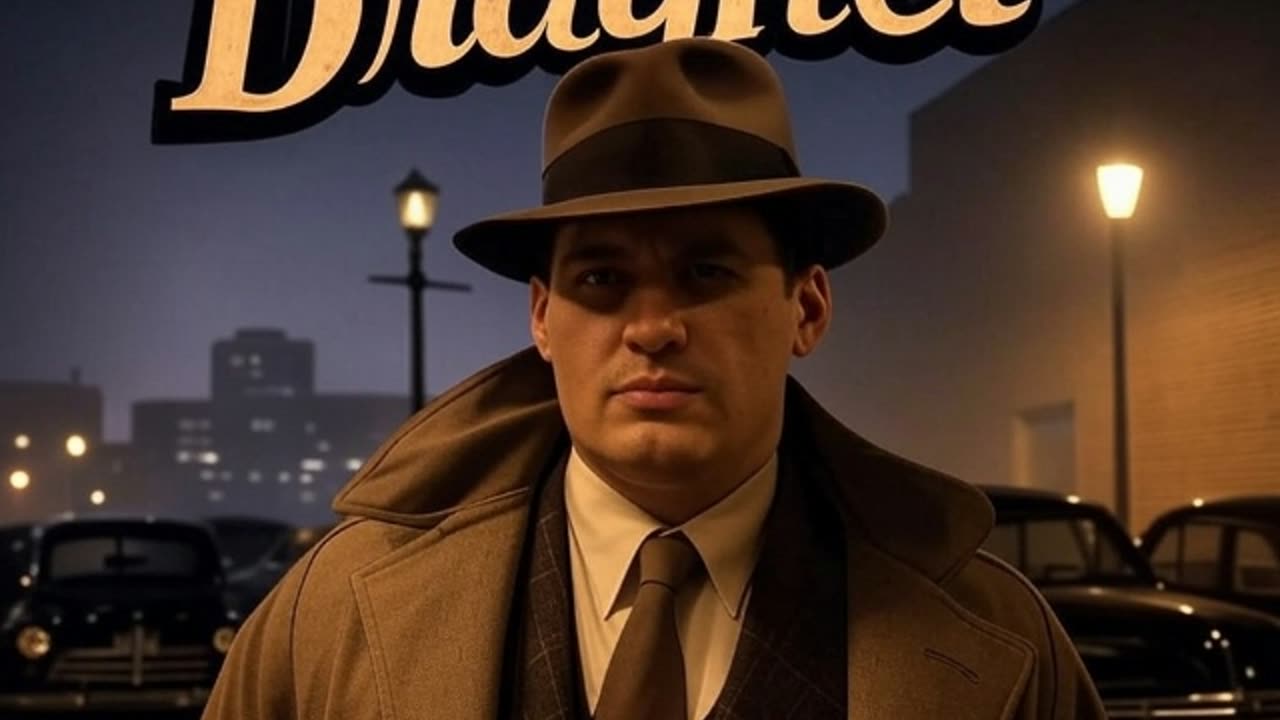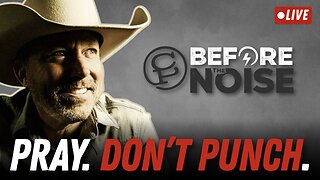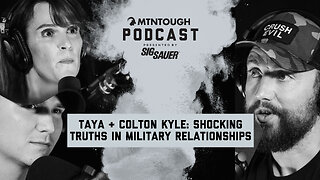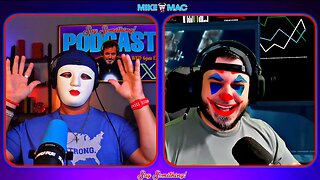Premium Only Content

Dragnet: Production 3 aka The Werewolf (June 17, 1949)
Setting: Los Angeles, California, in 1949, with scenes in police headquarters, city streets, residential neighborhoods, and seedy hideouts. The episode uses sound effects like police sirens, footsteps, radio dispatches, and door knocks to create a realistic, urban atmosphere, emphasizing the meticulous nature of police work.
Plot:
Introduction: The episode opens with the iconic Dragnet theme, “Danger Ahead,” featuring its four-note brass and timpani motif, followed by announcer Hal Gibney’s narration: “Ladies and gentlemen, the story you are about to hear is true. Only the names have been changed to protect the innocent.” Joe Friday’s voice-over sets the scene, noting the date, time, and location, introducing a case from the LAPD’s Robbery Division.
The Crime: The story begins with a series of violent robberies targeting women in Los Angeles, committed by a mysterious figure dubbed “The Werewolf” due to his savage attacks and nocturnal habits. The perpetrator, described as a tall, dark-haired man with a menacing presence, assaults his victims, stealing purses and jewelry, often leaving them injured. The case escalates when a recent attack nearly turns deadly, prompting urgent police action.
The Investigation: Joe Friday (Jack Webb) and his partner, Sergeant Ben Romero (Barton Yarborough), are assigned to the case. They start with witness interviews, gathering descriptions from victims who note the suspect’s distinctive features, possibly a scar or unusual clothing. The episode highlights Dragnet’s procedural realism, with Friday narrating steps like canvassing neighborhoods, checking police files for similar crimes, and consulting informants. A lead emerges from a pawnshop where stolen jewelry surfaces, pointing to a known criminal or a new suspect.
Pursuing the Suspect: The detectives follow clues to a suspect, possibly named “Frank” or “Eddie” (aliases common in Dragnet), tracking him to a cheap hotel or apartment. The investigation involves stakeouts, interrogations of associates, and forensic work, such as matching fingerprints or analyzing stolen goods. Key scenes include Friday and Romero questioning a nervous fence or a victim’s neighbor, with dialogue reflecting Webb’s commitment to authentic police jargon. The “Werewolf” nickname adds a sensational touch, though the episode grounds it in realistic crime, avoiding supernatural elements.
Climax and Resolution: The climax features a tense confrontation, likely a chase or arrest, as Friday and Romero corner the suspect in a dark alley or hideout. The “Werewolf” may resist, leading to a brief scuffle, with sound effects of shouts, running footsteps, or handcuffs snapping. The suspect is apprehended, and evidence—stolen items and victim testimonies—secures his conviction. Gibney’s closing narration details the outcome, likely a prison sentence for robbery and assault, emphasizing justice served. Friday’s final voice-over reflects on the case’s toll, underscoring the victims’ trauma and the police’s duty.
Themes: The relentless pursuit of justice, the danger of urban crime, and the human cost of violence. The episode reinforces Dragnet’s portrayal of police as dedicated, methodical professionals, countering romanticized crime dramas of the era.
Cast and Roles:
Sergeant Joe Friday: Played by Jack Webb, delivering a stoic, factual performance as the determined detective, with his clipped narration driving the procedural narrative.
Sergeant Ben Romero: Played by Barton Yarborough, portraying Friday’s experienced partner with a warm, slightly humorous tone, providing balance to Friday’s intensity.
Supporting Characters: Unnamed ensemble actors, likely including:
Suspect (“The Werewolf”): Voiced by a radio veteran like Charlie McGraw, depicting a menacing, volatile criminal with a gritty tone.
Victims/Witnesses: Women attacked by the suspect, voiced with fear or resolve, or neighbors and informants providing clues, reflecting LA’s diverse populace.
Police Personnel: Desk officers, lab technicians, or radio operators, voiced briefly to emphasize procedure.
Announcer: Hal Gibney, delivering the opening and closing narrations, including the case’s resolution, with a clear, authoritative voice.
Note on Cast: Dragnet used a tight cast of radio professionals, with Webb and Yarborough as anchors, supported by actors doubling in minor roles. Performances prioritized authenticity, avoiding the melodrama of shows like The Shadow.
Production Details:
Music: The “Danger Ahead” theme, composed by Walter Schumann, opens and closes the episode, with minimal incidental music to maintain realism. Sound effects drive the narrative’s tension.
Writer/Director: Jack Webb, with contributions from James E. Moser, adapting the script from real LAPD case files, focusing on procedural accuracy and authentic dialogue.
Sound Effects: Essential to the episode, including police sirens, footsteps, radio static, door knocks, and occasional scuffle sounds, creating a vivid urban crime scene. The “Werewolf”’s attacks might be marked by screams or rustling.
Sponsor: Unsponsored in its early run, Dragnet relied on NBC’s support, with no commercial breaks noted in this episode, allowing uninterrupted storytelling.
World and National Events Around June 17, 1949:
To provide context for the broadcast, here are key world and national events occurring in June 1949, reflecting the post-war and early Cold War climate that shaped listeners’ perspectives:
World Events:
Cold War Developments: The Berlin Blockade ended on May 12, 1949, with the U.S.-led Berlin Airlift thwarting Soviet efforts to isolate West Berlin. By June, the formation of West Germany (May 23) and NATO (April 4) solidified Western alliances, with radio news emphasizing U.S.-Soviet tensions as a defining global issue.
Chinese Civil War: The Chinese Communist Party, led by Mao Zedong, advanced against the Nationalists, capturing Shanghai in May 1949. U.S. media reported growing concerns about a Communist victory, fueling anti-communist sentiment and debates over U.S. intervention.
International Relations: The Council of Europe, established on May 5, promoted European unity, while the U.S. advocated containment of communism, a frequent topic on radio news. The Geneva Conventions were being finalized (adopted August 1949), reflecting post-war humanitarian efforts.
South African Apartheid: South Africa’s apartheid policies tightened with the Prohibition of Mixed Marriages Act (May 1949), drawing U.S. media criticism as a human rights violation, reported alongside global decolonization movements.
National Events:
Red Scare and McCarthyism: The House Un-American Activities Committee (HUAC) intensified probes into alleged communist influence, with the Alger Hiss trial (began May 31, 1949) accusing a former State Department official of espionage. Radio broadcasts amplified public fears of internal subversion.
Economic Prosperity: Post-war economic growth continued, with unemployment at 5.9% and rising consumer spending. The Fair Labor Standards Act amendments (1949) raised the minimum wage to 75 cents, boosting worker optimism, covered in news reports.
Entertainment and Morale: Hollywood thrived, with films like The Fountainhead (premiered June 23) and Sands of Iwo Jima (filming in 1949) reflecting patriotic and individualistic themes. Radio shows like The Lone Ranger and Suspense were popular, while Dragnet’s realistic crime drama carved a new niche.
Sports and Culture: The 1949 MLB season featured the New York Yankees and Brooklyn Dodgers, with Jackie Robinson breaking racial barriers. The NBA’s formation (June 6) marked a sports milestone. Nat King Cole’s rising hits, like “Nature Boy,” defined the era’s music scene.
Cultural Context: Aired during the early Cold War, “The Werewolf” resonated with American listeners by portraying police as steadfast guardians against urban crime, reflecting a desire for order amid fears of communism and post-war social change. The episode’s violent “Werewolf” suspect tapped into anxieties about rising crime rates, amplified by noir films like White Heat (released September 1949) and pulp detective stories. Dragnet’s procedural realism, airing Friday nights, contrasted with sensational horror like The Sealed Book, appealing to listeners seeking grounded narratives that celebrated law enforcement’s role in a prosperous yet uncertain nation. The nickname “Werewolf” added a catchy, if exaggerated, hook, aligning with Webb’s balance of drama and authenticity.
-
 LIVE
LIVE
Badlands Media
6 hours agoBadlands Daily: November 3, 2025
3,025 watching -
 LIVE
LIVE
Wendy Bell Radio
5 hours agoThings Will Get Worse Before They Get Better
7,888 watching -
 1:08:17
1:08:17
Chad Prather
8 hours agoHow to Get Along With People You Don’t Even Like (Most of the Time)
49.3K15 -
 1:45:29
1:45:29
MTNTOUGH Podcast w/ Dustin Diefenderfer
8 hours agoTaya + Colton Kyle: Can American Marriages Survive 2025? | MTNPOD #140
95 -
 1:12:23
1:12:23
The Bold Lib
16 hours agoSay Something Beyond W/MikeMac: JOKER - Ep.12
50 -
 LIVE
LIVE
LFA TV
16 hours agoLIVE & BREAKING NEWS! | MONDAY 11/3/25
3,132 watching -
 1:30:13
1:30:13
Game On!
14 hours ago $6.64 earnedChiefs Dynasty OVER, New Longest FG RECORD, and Patriots Are Winning The Super Bowl!
18.1K2 -
 4:02:17
4:02:17
The Bubba Army
3 days agoIS AMERICA OVER TRUMP? - Bubba the Love Sponge® Show | 11/03/25
81K30 -
 48:57
48:57
Man in America
18 hours agoThe Sinister Reason They Put Fluoride in Everything w/ Larry Oberheu
362K103 -
 1:06:56
1:06:56
Sarah Westall
16 hours agoAstrological Predictions, Epstein & Charlie Kirk w/ Kim Iversen
99.8K74